Design Lean in ICT, Proces optimization
Improving processes - change transitions
Exploring - improving, processes (operational)
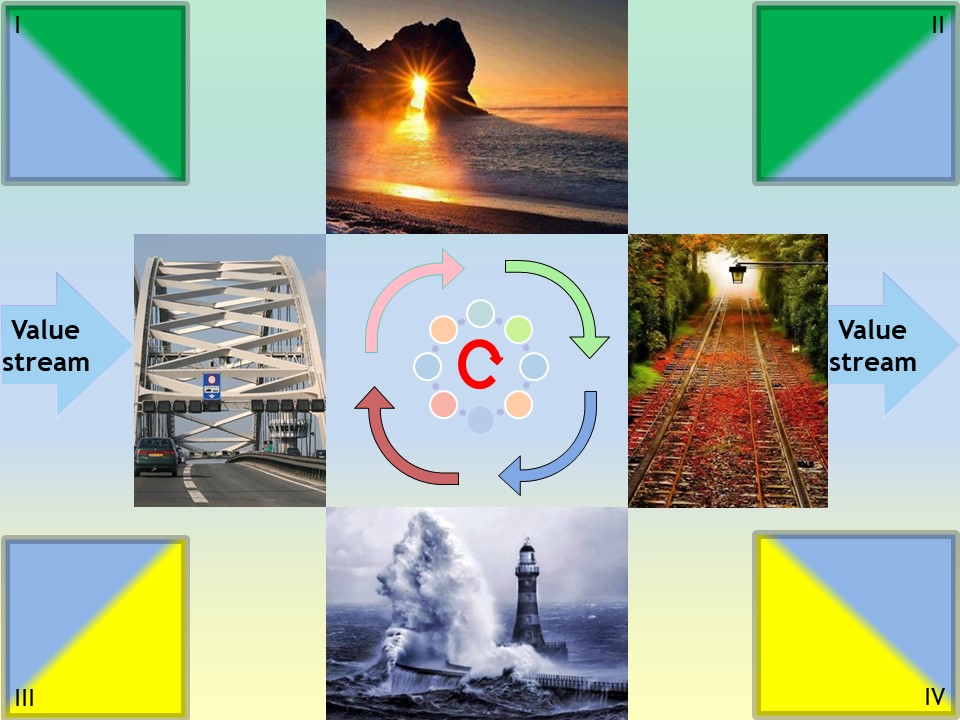
Tools for data processing, the way you are structuring data, is normally not unique. I have placed those as exterenal.
The content usage (BI analytics) is internal.
The challenge is in how to use information to add value to the organisation.
🔰 Most logical
back reference.
Contents

Combined pages as single topic.
👓 info types different types of information
🚧 Value Stream of the inforamtion product
👓 transform information Working cell
👓 bi tech Business Intelligence, Analytics
Progress
THis chapter is completely fresh, topics are:
- 2019 week 42
- Building up this page as last one in a series of splitting.
- There was no connection between the BP SDL at the internal organisation tot the topics that are external to the organisation.

Technology - or - business Process.
Change is often pushed by a change in technology. Fear of left behind resulting in conformation to what others are doing.
Administration supporting business Process.
The operational process of administration was for some decades ago all paperwork. It switched from paperwork into using computers and software.
 By some estimates, more than half of the cost of producing companies are in administration. Up to 80 percent of the lead time is due to administration.
By some estimates, more than half of the cost of producing companies are in administration. Up to 80 percent of the lead time is due to administration.
(see link with figure 👓 )
Seeing what is going on can be a problem for measuring spent time by the workers.
For administration, however, this is also more difficult. Modern administration is usually done on a computer.
Observing an administration office is seeing a lot of people doing something on a computer - and unless you pay close attention, you have no idea if this is actual work or Facebook.
There is a huge cost factor by administraion when having physical products. It is probably worse when the product itself is administrative. Concepts of lean processing are hard to get practised.
Since it is more difficult, it often means that fewer people have tried. Hence, there are more low-hanging fruits. It may be near impossible to achieve the efficiency, speed, and quality of a modern assembly line in administration, yet any step in that direction will improve your bottom line.
As mentioned above, most of the ideas and methods behind lean will also work in administration.
Software buidling, Technology for administration.
Software is a tool for doing administration. There are questions on having the software available for the main value stream: administration.
Delivering the software as some administrative tool is mostly a push, technology driven approach. That the customer is not happy with that pushing.
👓
(M.Fowler)
In the last decade agile software development has moved from being a cult technique to an increasing part of the mainstream.
I was lucky enough to be at the beginning of this story, with early experiences on the 'birth project' of Extreme Programming and a co-author of the Manifesto for Agile Software Development.
🎯 Principles behind the Agile Manifesto
We follow these principles:
- Our highest priority is to satisfy the customer through early and continuous delivery of valuable software.
- Welcome changing requirements, even late in development. Agile processes harness change for the customer's competitive advantage.
- Deliver working software frequently, from a couple of weeks to a couple of months, with a preference to the shorter timescale.
- Business people and developers must work together daily throughout the project.
- Build projects around motivated individuals. Give them the environment and support they need,and trust them to get the job done.
- The most efficient and effective method of conveying information to and within a development team is face-to-face conversation.
- Working software is the primary measure of progress. Agile processes promote sustainable development.
- The sponsors, developers, and users should be able to maintain a constant pace indefinitely.
- Continuous attention to technical excellence and good design enhances agility.
- Simplicity--the art of maximizing the amount of work not done--is essential.
- The best architectures, requirements, and designs emerge from self-organizing teams.
- At regular intervals, the team reflects on how to become more effective, then tunes and adjusts its behavior accordingly.
Many good intentions, but why those weird contradictions?
⚠ Plan-driven engineering seeks a process which provides enough structure to reduce individual variations to insignificance.
Such an industrial process is more predictable, copes better when people transfer, and is easier to define skills and career paths.
🤔 Agile engineering sees software development as a primarily human activity, where the people involved and how they bond as a team are the primary driver behind success.
Processes (and tools) can enhance a team´s effectiveness, but are always second-order influences.

Some values stream basics.
There is no real objection to apply a value stream approach in administrative processes.
Variety Veracity as complexity in administrative systems.
The administrative processes are having often a combination of very standardized by fixed prescriptive steps and have a tremendous variety by all kind of possible situations.
(see link with figure 👓)
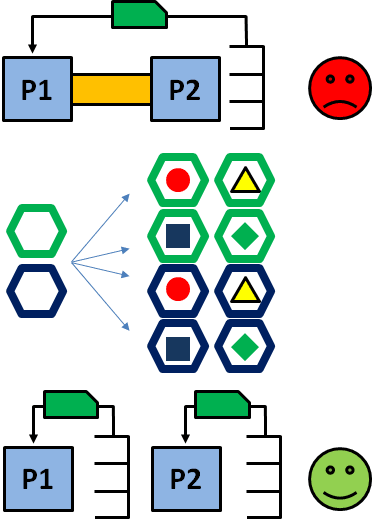 In a FIFO lane, the process knows what to produce through the parts coming down the FIFO lane. However, when differentiating into variants, the information has to be conveyed separately (for example, through an attached paper). Secondly, this decision has to be already made in the first process.
In a FIFO lane, the process knows what to produce through the parts coming down the FIFO lane. However, when differentiating into variants, the information has to be conveyed separately (for example, through an attached paper). Secondly, this decision has to be already made in the first process.
The translations into software systems would be decoupling them.
The difference in software systems is that the supermarkt buffering is not made very clear. Solutions would be an ESB Enteprise Service Bus message or file oriented, or api's (application program interfaces).
A supermarket avoids the complexity of conveying additional information along the FIFO lane. Additionally, you have the flexibility to use a part in the supermarket for any variant you choose.
The final reason to opt for a supermarket instead of a FIFO lane is if there is a change in responsibility. If the material flow leaves one department and enters other departments, a supermarket may make things easier.
Symbols being used in a Value Stream.
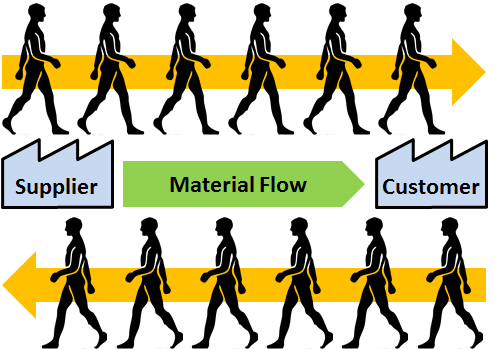
(see link with figure 👓)
There are not that many symbols used. The main purpose is getting understanding and doing communication with others. The line is going from supplier to the customer. Those word are used without a clear definition.
In the context being used that should get clear.
Visualize Your System - Overview of Diagrams in Manufacturing ,
Overview of Value Stream Mapping Symbols
Delivering enough material for the assembly proces.
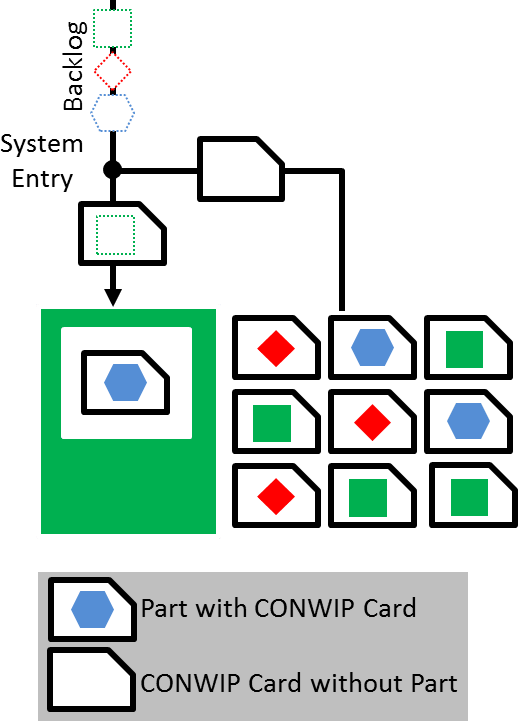
Not everything is at best with a kanban system. When there are many different parts needed these are required at the assembly moment. Being prepared in time will overcome running out of those.
(see link with figure 👓)
There is broad agreement in industry that a pull system is in almost all cases better than a push system. The most famous way to establish a pull system is to use a kanban system.
The idea of kanban is so much associated with pull production that the two terms are sometimes even used synonymously. However, there are other ways to implement pull.
Another useful approach is CONWIP, standing for Constant Work In Progress and developed by Mark Spearman and Wallace Hopp in 1990.

Software & lean.
The word lean manfacturing got stolen by software builders. Software building is not designing business processes it is about creating tools for changing manipulating the informations products.
Limiting context, small is beautifull.
Too often all what is there is combined is a complete monolitic vision that wil hit everyone involved. Decomposing in smaller area's of interest and defnining the boundaries of communication will reduce complexity.
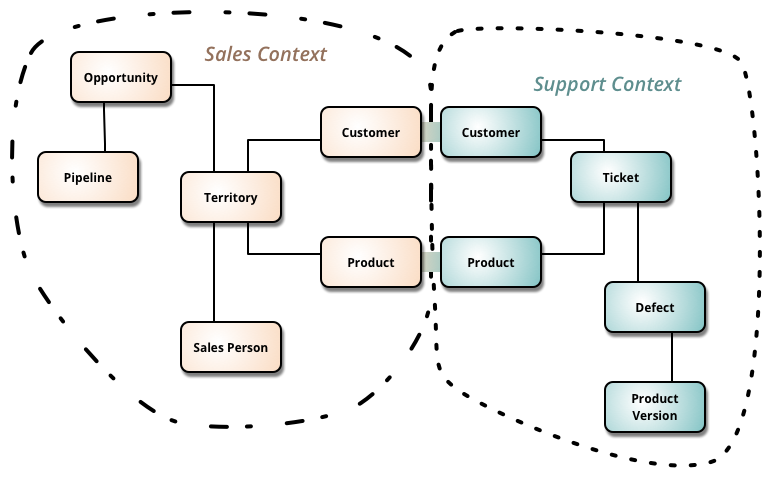
(see link with figure 👓)
Bounded Context is a central pattern in Domain-Driven Design. It is the focus of DDD's strategic design section which is all about dealing with large models and teams.
DDD deals with large models by dividing them into different Bounded Contexts and being explicit about their interrelationships.
Refactoring being te same as lean?
👓
M.Fowler on refactoring
noun: a change made to the internal structure of software to make it easier to understand and cheaper to modify without changing its observable behavior
verb: to restructure software by applying a series of refactorings without changing its observable behavior.
Refactoring isn't another word for cleaning up code - it specifically defines one technique for improving the health of a code-base.
I use "restructuring" as a more general term for reorganizing code that may incorporate other techniques.
This sounds like improving software (the process) in a way the lean processing optimization is promoting. Doing the same things more efficiënt.
Terminal usage or an initiator executor process.
In the old days computer accesss was done by using terminals.
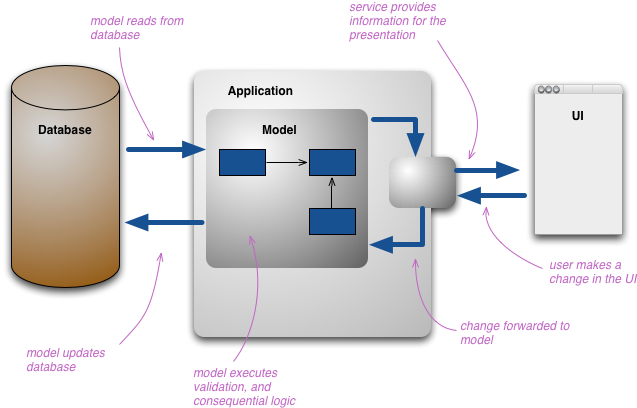
(link figure 👓)
The mainstream approach people use for interacting with an information system is to treat it as a CRUD datastore.
Crud looks like the terminal usage.
In the Cliënt Server approach the ide of the initiator executor was born. Reducing complexity by defining its special functionalities.
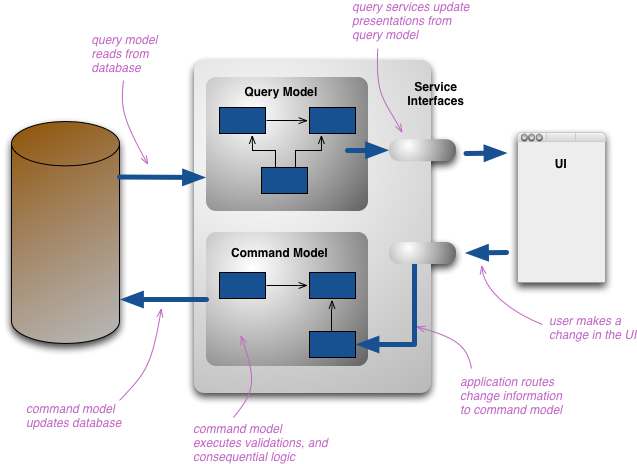
(link figure 👓)
CQRS stands for Command Query Responsibility Segregation. It's a pattern that I first heard described by Greg Young.
CQRS looks like a process circle. In the pull-push circle of a process this figure does follow that.

Design thinking.
Refocus on business processes is back to basics with new words.
A different starting point for improvement.
Defintion: The design thinking ideology asserts that a hands-on, user-centric approach to problem solving can lead to innovation, and innovation can lead to differentiation and a competitive advantage.
This hands-on, user-centric approach is defined by the design thinking process and comprises 6 distinct phases, as defined and illustrated below.
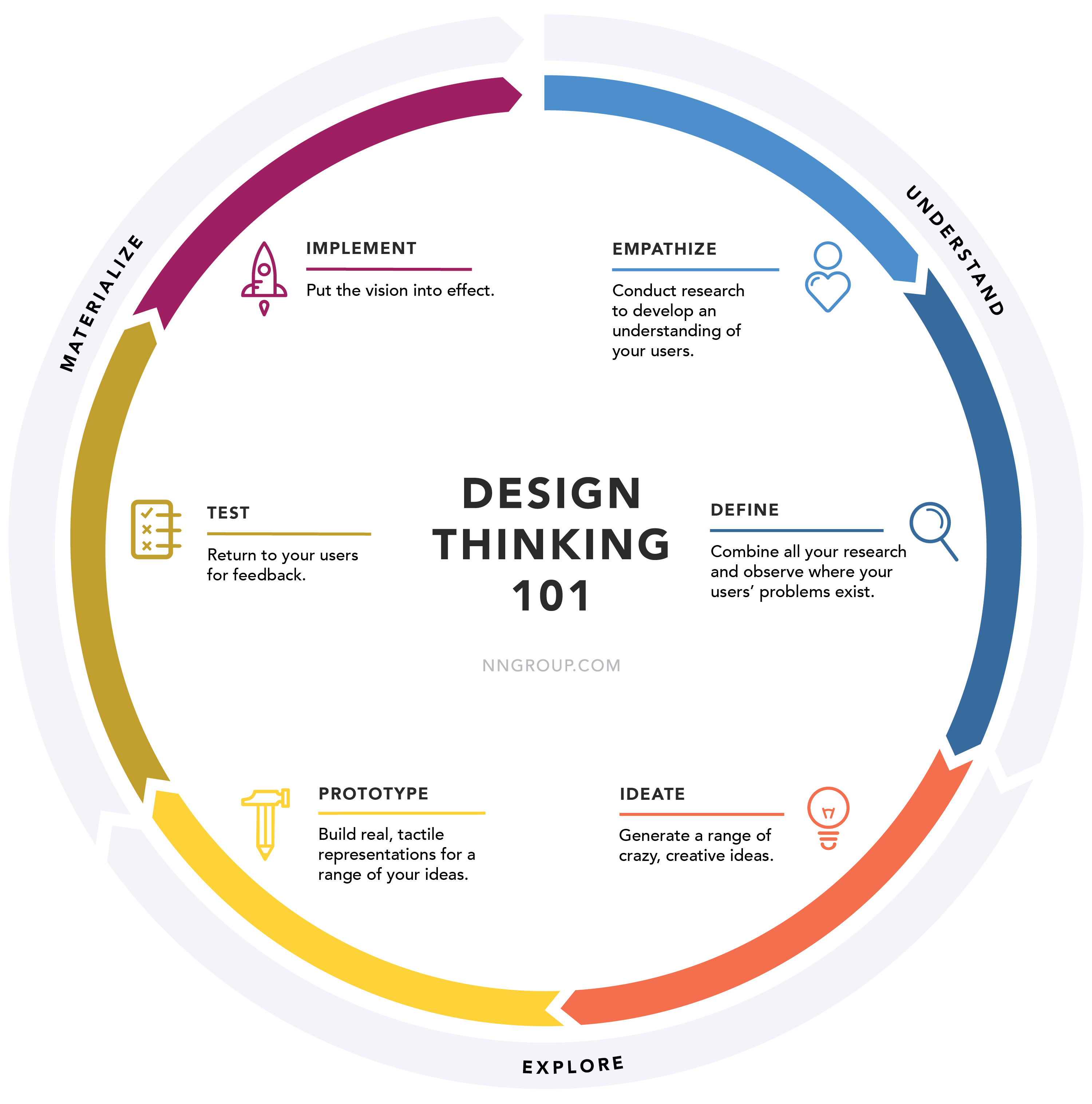
(see link with figure 👓)
The assumption with that circle is that is a continuous evolvement only. In the other figure the dependencies are shown. The remarkable similarity here is that is a like a waterfall.
The waterfall like development is cursed with software development because of not delivering something the business can see end evaluate during development.
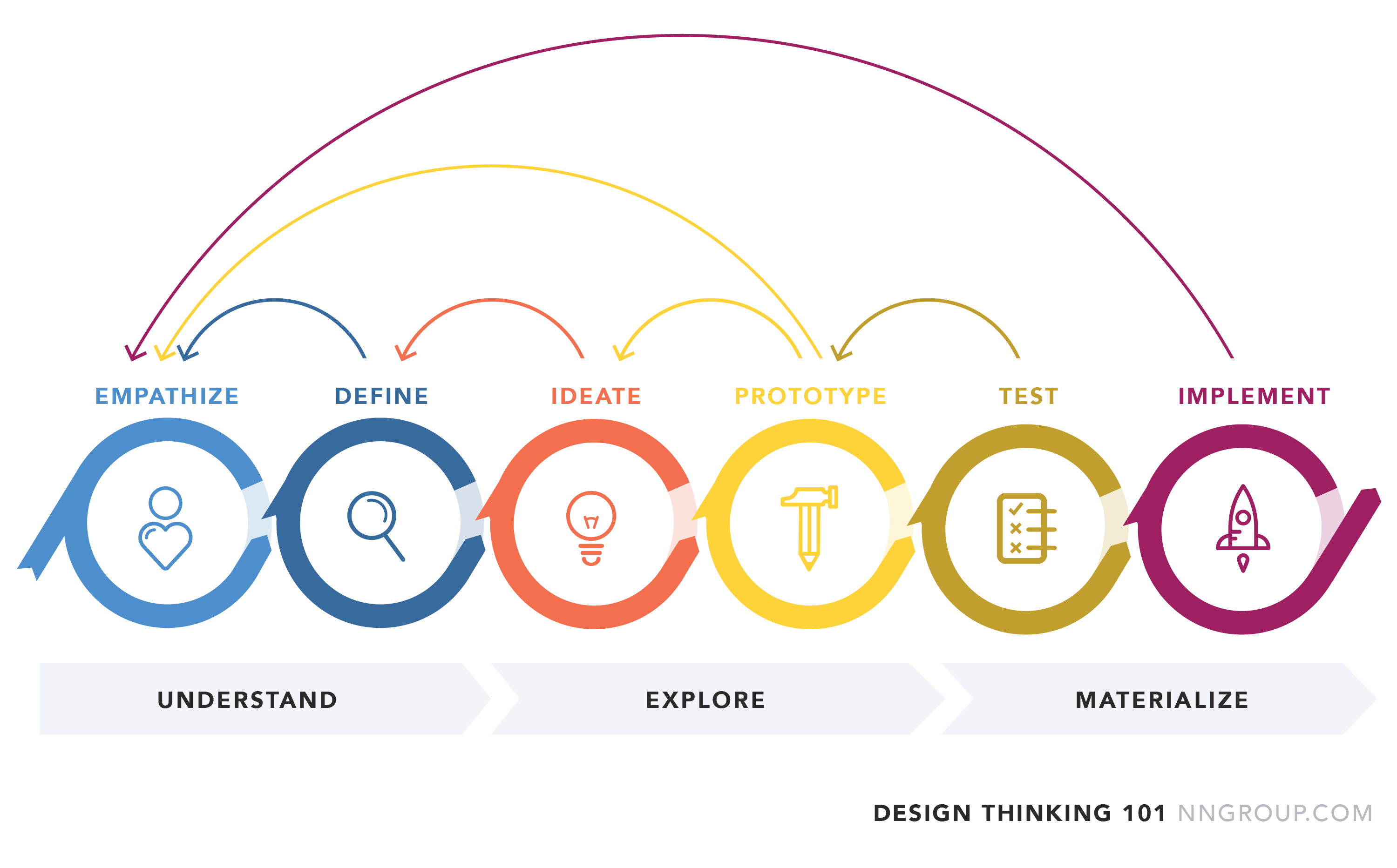
The process symbol - process pull push circle.
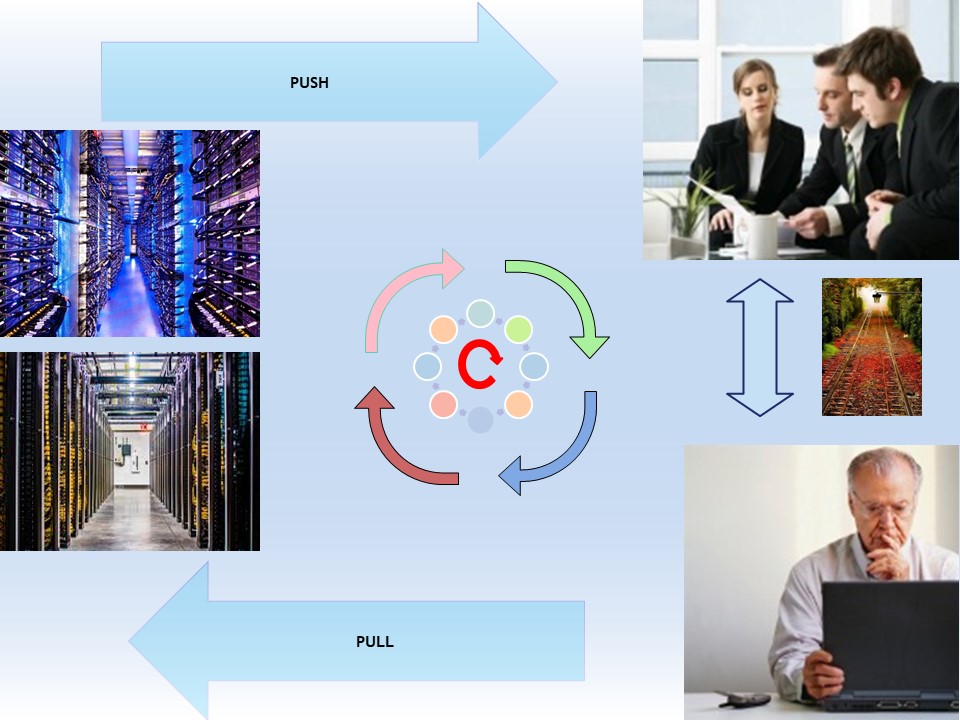
This philosophy started evaluating the pull push request for software in an administrative process.
We could call it now a CQRS work cell approach, but there is far more.
On the four corners we have the involved parties for processes, diagonals.
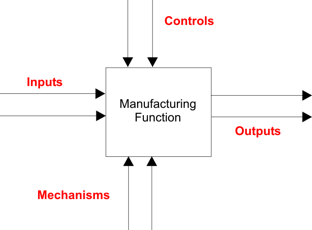
The information flows: input, output and controls, mechanisms are on the horizontals - verticals
These two approaches are to be combined in a generic process approach.
When the details of a work cell are not needed the common value stream diagrams can be used.

Inventing change Transformations.
When using those generic ideas on organising processes outside of physical engineering into administrative, basic building blocks are missing.
Work cell - defining administrative software process.
🎭 ❓ Issue: An administrative work cell is not defined.
Defining the work cell before building the needed tools / software could help improving the value stream within administrative goals.
Why not try to define the building up of a administrative work cell?
Agile contradictions.
💣 In the agile manifesto is mentioned as a problem that the business request is for predcitive results (what is deleiverd when).
Another one is that is better to be dependent on the creativity of a developer than it will be comoon building blocks.
changing an organisaton softwre process in a cycle.
recap:
- 🕛 Business Understanding, data understanding
- 🕒 Data understanding preparation, modelling
- 🕕 Deployment model - user acceptance
- 🕘 delivery, model exploitation, monitoring
Combined pages as single topic.

👓 info types different types of information
✅ Value Stream of the inforamtion product
👓 transform information Working cell
👓 bi tech Business Intelligence, Analytics
🔰 Most logical
back reference.
 Tools for data processing, the way you are structuring data, is normally not unique. I have placed those as exterenal.
Tools for data processing, the way you are structuring data, is normally not unique. I have placed those as exterenal.

 By some estimates, more than half of the cost of producing companies are in administration. Up to 80 percent of the lead time is due to administration.
By some estimates, more than half of the cost of producing companies are in administration. Up to 80 percent of the lead time is due to administration. 
 In a FIFO lane, the process knows what to produce through the parts coming down the FIFO lane. However, when differentiating into variants, the information has to be conveyed separately (for example, through an attached paper). Secondly, this decision has to be already made in the first process.
In a FIFO lane, the process knows what to produce through the parts coming down the FIFO lane. However, when differentiating into variants, the information has to be conveyed separately (for example, through an attached paper). Secondly, this decision has to be already made in the first process.  (see link with figure 👓)
(see link with figure 👓) Not everything is at best with a kanban system. When there are many different parts needed these are required at the assembly moment. Being prepared in time will overcome running out of those.
Not everything is at best with a kanban system. When there are many different parts needed these are required at the assembly moment. Being prepared in time will overcome running out of those. 
 (see link with figure 👓)
(see link with figure 👓)  (link figure 👓)
The mainstream approach people use for interacting with an information system is to treat it as a CRUD datastore.
(link figure 👓)
The mainstream approach people use for interacting with an information system is to treat it as a CRUD datastore.  (link figure 👓)
CQRS stands for Command Query Responsibility Segregation. It's a pattern that I first heard described by Greg Young.
(link figure 👓)
CQRS stands for Command Query Responsibility Segregation. It's a pattern that I first heard described by Greg Young. 
 (see link with figure 👓)
(see link with figure 👓)



